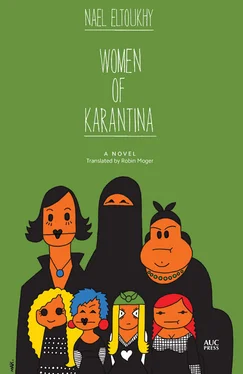This modest paragraph was the most widely circulated piece of psychological analysis of the day. It was quoted in all the papers and everyone knew it. They would recite it, adding analyses of their own. The 2060s were the worst decade as far as Alexandria’s reputation was concerned.
The impact this had on the Egyptian state — as represented by the Interior Ministry — was clear to see. The minister had frequently come under fire for tolerating the existence of Karantina, with all the threats it posed to the peaceable and kind-hearted national character, and equally frequently the governor had stepped in to reassure the world that they were drawing up plans to do away with the cesspool (the officially approved moniker for Karantina), but no one did a thing. Then, without warning, in an unprecedented move by the president, the minister and governor were both sacked. The residents of the neighborhood noted a certain escalation in tone. Karantina was encircled by a number of banners bearing the signature of the Interior Minister himself. The message they conveyed was unambiguous: “Respect the police”; “You will destroy the cesspool with your own hands.” Plus a poem:
The first fruits dangle down
When January the twenty-fifth rolls around
Year in, year out
We love the police
We fear the police
And we do just what we’re told.
So it was that the new minister and the new governor began their terms in office. Both pledged to get rid of Karantina once and for all. Their tone was violent and spoke of patience worn thin. Indeed — in a snippet subsequently leaked on the Internet — the Minister of the Interior slammed his hand on the table and screamed, That fucking place needs to know its limits!
The explanation above is vital if we are to understand what followed. On March 14, 2064, an advertisement was published in all the Egyptian newspapers, the text of which ran as follows:
Dear citizens,
We wish to inform you that in two weeks from now, on March 28, 2064, the neighborhood of Karantina in the Karmouz district of the governorate of Alexandria will be cleared. All citizens resident in this neighborhood will be transported directly to temporary shelter until such time as the housing units in Mohamediya have been made ready for their arrival. We ask all citizens to refrain from obstructing our troops, officers, and police units, who will clear the area by force if necessary. The Egyptian state disclaims all responsibility for any casualties that might arise in the event of force being used against decent policemen who are devotedly and selflessly doing their duty for their country.
Success comes from God alone,
The Karmouz Municipality
Alone in the darkness at one in the morning, a woman in a niqab walked down the street from Sousou’s Karabantina to Ali and Inji’s Karantina. No one could tell what she was thinking, especially given her covered face, nor why she was abroad at this late hour, nor how — more importantly — she managed to cross the checkpoints that divided the two Karantinas with such assurance, untroubled by the search committees installed in no man’s land.
A munaqqaba in a billowing black robe, striding past the sleepless youth and encountering a checkpoint, proceeding on her way without answering the men who beckoned her over. A munaqqaba, walking alone until she came to a kushari joint — Hamada’s Daughters — about to close its doors. She stands outside until someone comes out and asks for her order. She says she wants to speak to Madame Yara about something important. This is what she asks for and refuses to say a syllable more unless Yara comes in person. Yara comes outside. How are you, Yara? says the woman, simply. I’m Amira, your Auntie Minna’s girl. I want to talk to you about an urgent matter.
In the apartment, Yara made tea for Amira, who had taken off her niqab. Lara woke up and joined them. Three women, none more than midway through their third decade, but bearing on their shoulders the responsibility of fashioning a world — and in the belly of one, in Yara, a fetus in its fourth month. You will have to excuse us for reproducing their conversation in its entirety, but no single extract allows us to understand what was going on, nor to appreciate the tremendous tension that filled the air. We beg indulgence, compelled as we are to bring you every word, every syllable spoken, for without the details the thing is meaningless. The three women drank tea and each scrutinized the others. The visit came as a surprise to Yara and Lara both, but its purpose was clear all the same. The same thought had occurred to all three women two days before — the thought it now fell to Amira to explain: The Interior said they’d clear the neighborhood by force.
Yara muttered, They won’t be able to.
Lara added, If they wanted to clear it they’d have done it long ago, and she looked at her sister.
Amira said the day’s papers had reports of some secret plan to attack Karantina, and that the president had come on TV not long ago to say that the people living there had better find themselves somewhere else to stay, or else the government wouldn’t be responsible for what happened. Yara and Lara looked at each other. They knew, and they were worried.
Amira: I don’t want to scare you guys. We’re in the right, after all. We’re the ones who live here and we know what’s best for ourselves better than anyone else. And God’s on our side, not theirs. God is great.
Yara and Lara were silent. This side of Amira was new to them: a side dripping with faith in God and confidence in the righteous soul’s ability to overcome all obstacles. A side set straight by Sheikha Salha; a side the two girls did not know so well. A side with a prayer bruise the size of a pancake slap-bang in the center of its forehead. Yara tried to head off this spiritual assault. She said, They didn’t bother with us until you and those goons of yours started shooting. The spiritual assault didn’t flag for a second. Amira fixed the sisters with a stare and said: Maybe I’ve done you wrong, and God will hold me to account for every wrong I’ve done those who never harmed me. All I want is for Him to forgive us all. I’m asking that we stand together now against the Interior, the Friday after next. That’s all. And afterward we can do as we please. Kill each other, even, why not? She worried at the corner of a fingernail, then went on: If we unite, stand hand in hand, no one will be able to touch us. We don’t want trouble for trouble’s sake. Each of us thinks she’s in the right, but if we fight among ourselves then we’ll lose the lot and they’ll pack us off to those shitty housing projects. I’ve been to those Mohamediya projects and I’ve seen for myself. Filth and squalor: as bad as it gets.
Now you two might think I’m weak for coming here and asking to stop the war between us, but no. I swear by the Good Lord, if I wanted to I could blow the whole neighborhood sky-high and nothing could stop me. You ask folk in Karabantina.
Yara leaned toward Lara. Whispered something. Maybe she said Amira still thought she was the Amira of old. And Lara laughed. Amira looked at them both. Coldly, she asked Lara, Something funny, Lara? And Lara replied, No, not at all. I just thought of something.
The tension began to show in Amira’s voice, the tension the two sisters knew well. Shame on you, acting like that. Shame on you, laughing at me when I’ve come all this way to see you. Yara and Lara looked at each other, and Amira started to scream. That’s right! I came all this way because I’m worried about you, but as God’s my witness I can stop the Interior Ministry and the president himself in their tracks singlehanded! I’m to blame, though, for doing the right thing.
Читать дальше












